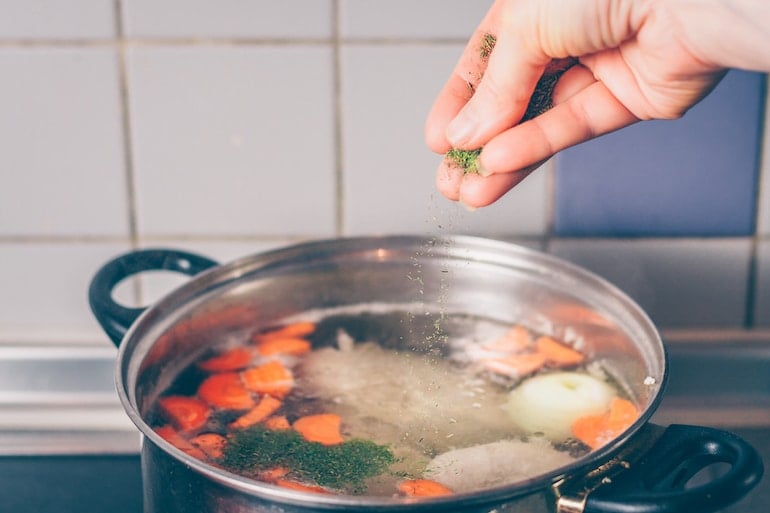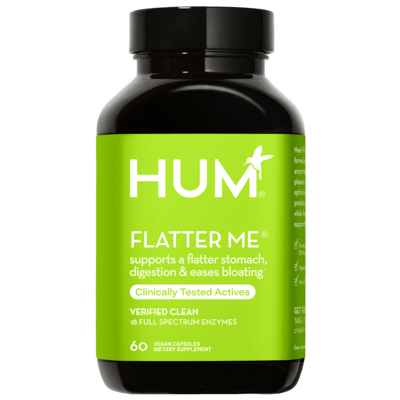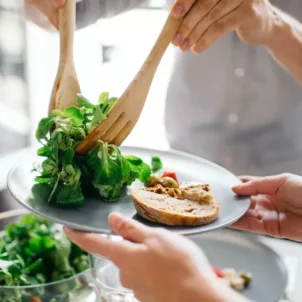Medically Reviewed By
Gaby Vaca-Flores, RDN, CLE
Registered Dietitian Nutritionist
Gaby Vaca-Flores, RDN, CLE, sheds light on how to prevent heartburn from occurring and what causes it.
As a dietitian, heartburn is a common condition my clients complain about all the time. In fact, it’s so common that the American College of Gastroenterology reports that over 60 million Americans feel heartburn at least once a month. That’s about one in five people!
But before you reach for antacids, let’s review what causes heartburn and simple dietary and lifestyle changes you can make to manage it.


What is heartburn?
The biggest tell-tale sign of heartburn is painful discomfort in the chest or throat. Typically, heartburn feels like a burning sensation that rushes upwards from the stomach. Acid indigestion and pyrosis are other names that are commonly used to describe heartburn.What causes Heartburn?
Heartburn is caused by a disruption of the body’s natural digestive process. Stomach acid—which consists of digestive fluid consisting of digestive enzymes, acid, and mucus—lines the stomach. These components all work to jumpstart the body’s breakdown of nutrients from food. Normally, a tiny valve known as the lower esophageal sphincter (LES) keeps stomach acid at bay by preventing the acid from going back up into the esophagus. However, heartburn occurs when stomach acid flows back past the LES and comes into contact with the esophagus, creating a traffic jam of sorts. When the esophageal lining is exposed to the stomach acid for too long, it creates a burning pain.
How to Prevent Heartburn
Instead of waiting to relieve heartburn once it shows up, there are simple ways you can begin to prevent heartburn in the first place. Many people find that a blend of dietary and lifestyle modifications can help reduce regular heartburn episodes.1. Avoid Foods that Trigger heartburn
This first tip is the simplest one to help prevent heartburn. The most common foods that cause heartburn include caffeine, alcohol, chocolate, tomato products, and foods that are greasy or spicy.2. Follow a Bland Diet
Also known as a soft diet, a bland diet may help prevent heartburn for those who experience symptoms frequently. A bland diet consists of easily digestible foods (including soup, lean meat, and weak tea) and limits the ones listed above, as well as foods high in fiber. Ideally, you’ll transition to a bland diet under the guidance of a health provider or registered dietitian.3. Control Your Portions
Another major cause of heartburn symptoms is eating large amounts of food in one sitting. Research suggests that large meals can increase LES pressure, making it difficult for stomach acid to stay out of the esophagus. Naturally, being mindful of portion control may be one of the best ways to prevent heartburn.4. Eat and Drink Slowly
Similar to the point above, you should aim to eat food and drink liquids slowly to give the stomach the time it needs to properly digest food. This strategy can potentially relieve stomach acid buildup, as well as support feelings of fullness without large portions.
5. Move After Meals
Post-meal care is key for heartburn prevention. Instead of laying down after a meal, which can make heartburn worse, try to do light activities to help reduce the onset of symptoms. Surely, I don’t advise performing a big workout on a full stomach. However, ideas include washing the dishes or take your dog for a walk. Simply aim to stay on your feet while your stomach metabolizes your meal. This tip is especially important if you frequently eat or snack later in the day. Consequently, it’s not recommended to eat a meal with two hours of your bedtime if you’re prone to heartburn.6. Chew Gum After Meals
This heartburn prevention tip is a home remedy that may neutralize acidity in the mouth and esophagus. A 2005 study found that 30 minutes of chewing sugar-free gum after a meal can help reduce symptoms associated with heartburn. Note: You should exclude peppermint gum in particular, as it can have the opposite desired effect by relaxing the LES. Additionally, frequent gum chewing isn’t favorable for good oral health. Expert opinions are mixed on the effectiveness of gum chewing as a heartburn solution. However, focusing on the simple act of chewing is still advised to reduce symptoms of heartburn. Chewing signals the mouth’s salivary glands to release important digestive enzymes. These enzymes help break down larger nutrients into smaller particles that are fit to travel down the esophagus. In other words, taking time to chew and savor each bite can help ease the onset of heartburn.7. Maintain a Healthy Weight
Healthy weight management is important to help prevent heartburn over the long haul. One study found that weight gain of 10 to 12 pounds is linked to significant increases in heartburn symptoms. For those who are overweight and experience occasional heartburn episodes, healthy weight loss can help improve both heartburn and your overall health.8. Quit Smoking
Since tobacco can have detrimental effects on saliva production, quitting smoking is beneficial to both prevent heartburn and support good health. As mentioned earlier, the salivary glands secrete saliva, key to initiate the digestive process. Tobacco also undesirably stimulates the LES, which can lead to unwanted exposure of stomach acid in the esophagus.9. Wear Loose Clothing
Finally, a minor but impactful tip for heartburn prevention is wearing comfortable clothing during and after meals. Avoid form-fitting clothes such as tight pants, constricting tops, shapewear, and belts that add pressure to the abdominal area. These types of restrictive clothing can potentially trigger stomach acid back flow.When to Consult a Doctor
If heartburn symptoms remain frequent or don’t go away after a few weeks of diet and lifestyle modifications, you should consult your doctor. Additionally, you should see your doctor about heartburn if you experience undesired weight loss, have difficulty swallowing food, or have an ongoing cough or wheezing. Lastly, seek urgent medical care if your heartburn feels like squeezing, crushing, or painful pressure in your chest; you experience black or maroon-colored stools; or you vomit material that’s bloody or looks like coffee grounds.Final Thoughts
Now that you’ve learned how to prevent heartburn, it’s time to put these tips to use to make painful episodes a thing of the past. The more you effort you put into dietary and lifestyle changes, the more likely you’ll be symptom-free.More like this










